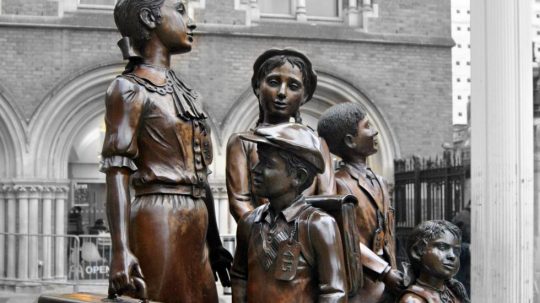Human rights are a cornerstone of UK society, but to benefit fully from their protection, it is important that we are able to discuss them.
For charities, government bodies and rights-related organisations all over the UK, translation services are unsung heroes protecting people’s human rights. Every right enshrined in the Human Rights Act (HRA) is supported by translation services, which can enable people to access rights they may never have known they had.
In the UK, people speak hundreds of different languages, with some of the most common, other than English, including Polish, Urdu, Arabic and Punjabi. Translation services make a significant contribution to the functioning of the country. Such services, in everything from healthcare and immigration to human resources and education, enable service providers to deliver their services to clients who may not otherwise be able to communicate their needs.
Clear Voice, which operates under parent charity Migrant Help, is a non-profit organisation that offers interpretation for around 200 languages. Its services are broad, encompassing professional telephone interpreting, face-to-face interpretation and video interpreting.
“We have a really huge range of clients: big government contracts, local authorities, the NHS, education and HR departments,” said Rachael Tew, sales and partnership manager for Clear Voice. “We cover a real broad range of types of situations that could be useful for human rights. It’s giving people a voice. Without translation, they wouldn’t have a voice.”
How Can Translation Services Protect People’s Rights?
Even though their rights are protected by the HRA, any asylum seeker or immigrant entering the UK will often come up against multiple barriers before they are able to settle comfortably in the country. Translation services ensure that their needs can be better met.
“We have a 24-hour helpline where asylum seekers can give us a call at any time, day or night, to talk through any issues or support that they might need or concerns that they have,” said Anna Ware, director of strategy and engagement for Migrant Help. “A big part of that is signposting to mental health support, which is very big at the moment, or legal support, letting them know what they’re entitled to.”
Without translation services, the maze of paperwork associated with immigration processes and claiming asylum would, for many, be impossible to navigate. Organisations like Migrant Help use translation services to help migrants and refugees in the UK ensure that they can stay.
“Interpreting is key to working with our clients, whether it’s modern-day slavery, asylum services, or even things like the EU Settlement Scheme, where citizens of the EU have to apply to get settled status in the UK,” added Ware. “Much of the time, people don’t speak very good English and people may not even understand what a settlement scheme is or that they need to apply for it to not be deported.”

Credit: Markus Spiske / Pexels
For those who arrive in the UK from countries where human rights are not enshrined in legislation, translation services empower refugees and migrants with the knowledge necessary to protect their newfound rights.
Sham Kyriakakis is a programme manager for Breaking Barriers, an organisation that uses translation services daily to enable refugees in London to acquire stable and fulfilling jobs. “When you are able to speak someone’s native language, you’re in a position to explain their entitlements to support from the state, like employment benefits and what they have access to,” he said. “That is really strongly linked to their wellbeing, their safety and their future. By informing people, you’re protecting them from abuse, and you’re ensuring that they have recourse to entitlements that they’re given under UK law that they might not necessarily have had in their home countries.”
Migrant Help also recognises the power of translation services to educate new arrivals on the rights to which they are now entitled.
“When an asylum seeker is destitute, they’re entitled to certain things such as accommodation, but in some countries, when you’re destitute, there is no support,” said Ware. “So when people ring up the helpline and say, ‘We’ve got nothing, I’ve got nowhere to stay,’ having someone from the same country explaining to them what they’re entitled to is so helpful.”

Credit: Shvets Production / Pexels
Translation, especially when delivered by someone from the same country or region, also builds trust between the organisation and the service user, making it more likely that they will come to the organisation for the assistance they need.
“In the UK, we always try and encourage clients to speak English as much as possible, so that they have the chance to practise and develop,” said Louise Thomson, head of programmes for Breaking Barriers. “But we found that sharing a native language with a client is, for obvious reasons, very important for building rapport and trust. If we have a member of staff who speaks the same language as a client, it’s good for them to be able to have some conversations in the native language.”
During the pandemic, demand for translation services exploded. Without easy access to family members who previously acted as translators, many had to tap into the other resources available.
“Most people suffered during Covid, businesses went downhill, but we grew massively,” explained Tew. “People who may have used their friend or family member or whatever to do the interpreting were no longer able to meet up and do that.”
What Struggles Do UK Translation Services Face?

Credit: Jhon David / Unsplash
As in all industries, there are barriers that make the translation process more difficult, especially the availability of translators for lesser-known languages.
The UK is a melting pot of cultures from all over the world and 2011 census data showed that 864,000 people in England and Wales reported speaking little or no English. Translation services help to plug this gap, but only if they can source as staff or volunteers those who speak the languages required.
Following the recent crisis in Afghanistan, Breaking Barriers has been trying to secure more translators to meet the needs of Afghan refugees settling in the UK.
“One thing we’ve really, really struggled with is recruiting Dari and Pashto speakers in the wake of the Afghanistan crisis over the summer,” said Thomson. “We had a lot of interest from businesses and other organisations wanting to know how they could help.”

Credit: Hannah Wright / Unsplash
She continued: “Lots of people were saying they could give us funding to hire someone who speaks the languages of people from Afghanistan, which is great, but we’ve really, really struggled because we don’t get many people applying. We don’t know where these communities are, so it’s definitely a gap from our perspective, at the moment.”
Although the UK government does provide free translation in sectors such as healthcare, in other areas the cost may be prohibitive for some people with little or no English. Small and medium-sized businesses (SMEs) can apply for funding for translation services through a new Internationalisation Fund, set up by the Department of International Trade. The scheme is expected to support up to 7,600 recipients to internationalise their business, using a £38 million pot.
While funding is being funnelled into the internationalisation of companies, charities and non-profit organisations rely on government grants, individual donations and support from partner organisations. To protect everyone’s human rights, translation services need to keep making noise about their successes to ensure they receive the investment required to protect the rights of all of the UK’s evolving population.







